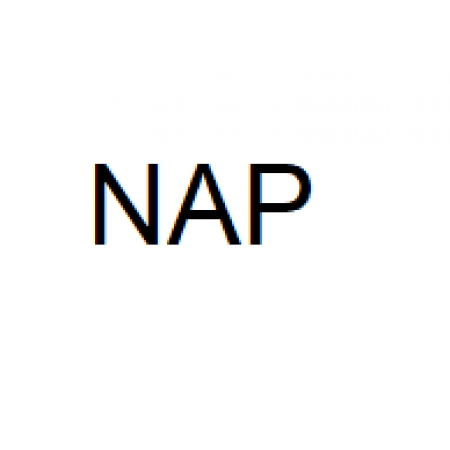 Stakeholder Response and Grievance Redress Mechanism for the “Building Capacity to Advance National Adaptation Plan Process in Mongolia” project.2022-12-9
Stakeholder Response and Grievance Redress Mechanism for the “Building Capacity to Advance National Adaptation Plan Process in Mongolia” project.2022-12-9The “Building Capacity to Advance National Adaptation Plan Process in Mongolia” project aims to be stakeholder responsive and relevant. For any perceived concerns and negative impacts caused by the project to the stakeholders, the project team, government, the UNEP, and the donor are willing to hear and address them in impartial and transparent manner. Concerns can be ideally forwarded to the project team or the executing partners (concerned government) for speedy and informed assessment of the context and the issues
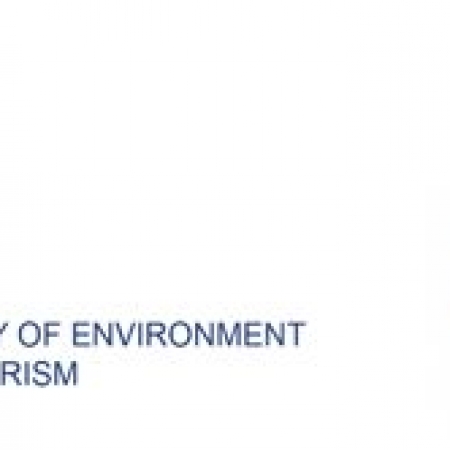 Vacancy announcement for consultant service2022-5-17
Vacancy announcement for consultant service2022-5-17UNEP is executing the Green Climate Fund (GCF) funded project entitled “Building Capacity to Advance National Adaptation Plan (NAP) Process in Mongolia” .The objective of the NAP project is to strengthen the institutional and technical capacity of Mongolia’s government at both the national and local levels to advance the process to formulate and enhance the long-term implementation of NAP as aligned with the policy and program.
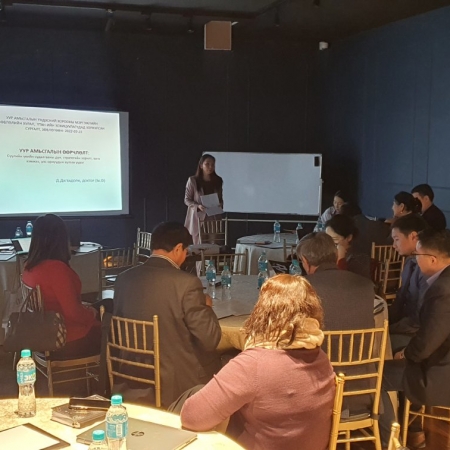 Regular meeting of experts council under the national clicmate committee2022-3-25
Regular meeting of experts council under the national clicmate committee2022-3-25The issues discussed at this meeting will be discussed at a regular meeting of the National Climate Committee.
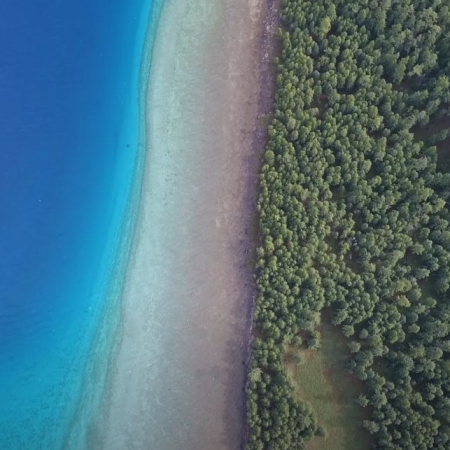 Relaxation Film - Mongolia Country with Piano Music | 4K Nature Video | Relaxing Music2022-3-15
Relaxation Film - Mongolia Country with Piano Music | 4K Nature Video | Relaxing Music2022-3-15Relaxing Music & Great as TV Screensaver (4K UHD)
Mongolia is one of the most beautiful places in the world and not known as the land of blue sky, home to the last authentic nomads, but also true destination of photographers and adventurous travelers. If you are one of those who love the stunning beauty of nature then Mongolia has so much more to offer as its natural scenery and breathtaking landscapes.
Travel around the world and enjoy Beautiful Relaxing Music
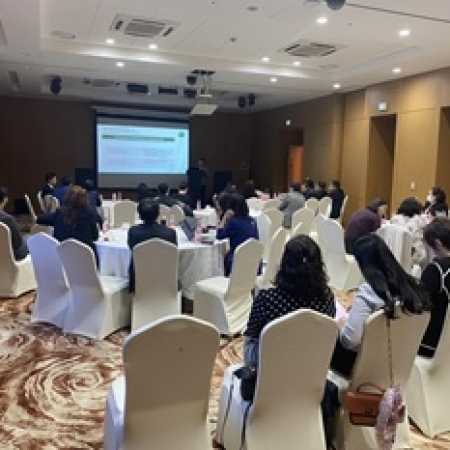 The Climate Change Research and Cooperation Centre under the Ministry of Environment and Tourism organized a workshop on “Climate Finance and Green Climate Fund” on the 10th of March 2022.2022-3-12
The Climate Change Research and Cooperation Centre under the Ministry of Environment and Tourism organized a workshop on “Climate Finance and Green Climate Fund” on the 10th of March 2022.2022-3-12The Climate Change Research and Cooperation Centre under the Ministry of Environment and Tourism organized a workshop on “Climate Finance and Green Climate Fund” on the 10th of March 2022.
 Announcement for Financial Audit Services for NAP Mongolia project2022-2-22
Announcement for Financial Audit Services for NAP Mongolia project2022-2-22Mongolia has accessed support under the GCF readiness and preparatory support, and activities are focusing on Establishing and strengthening the National Designated Authority (NDAs) or Focal Point. The project is expected to achieve the following outcomes:
 Vacancy announcement2022-2-16
Vacancy announcement2022-2-16The Government of Mongolia, Ministry of Environment and Tourism (MET) has been implementing a three-year project entitled “Building Capacity to Advance National Adaptation Plan Process in Mongolia”. The UN Environment Programme is the Delivery Partner for the project, with the role of supporting and overseeing the project implementation. The NAP project will support multi-sectoral, medium- to long-term adaptation planning and budgeting in Mongolia and promote the integration of climate change adaptation aspects into development policies.
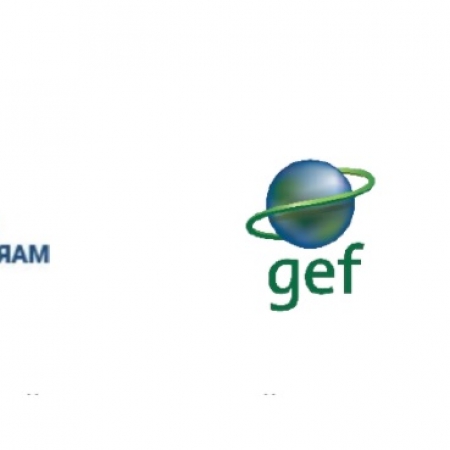 Vacancy announcement2021-11-2
Vacancy announcement2021-11-2The Government of Mongolia, Ministry of Environment and Tourism (MET) has been implementing a three-year project entitled “Building Capacity to Advance National Adaptation Plan Process in Mongolia”. The UN Environment Programme is the Delivery Partner for the project, with the role of supporting and overseeing the project implementation. The NAP project will support multi-sectoral, medium- to long-term adaptation planning and budgeting in Mongolia and promote the integration of climate change adaptation aspects into development policies.
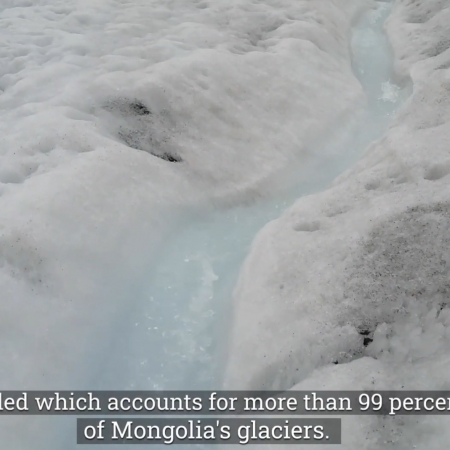 State of a glacier of Mongolia – Climate warming2021-11-1
State of a glacier of Mongolia – Climate warming2021-11-1Монголчууд бидний мөнх цас гэж нэрлэж буй уулын орой хэсгээр тархсан их хэмжээний цас, мөсийг судлаачид “мөстлөг” гэдэг. Мөстлөг нь өндөр уулархаг бүс нутгуудад орж буй хур тунадасны нөлөөгөөр үүсдэг, байгалийн чухал ач холбогдол бүхий бүрэлдэхүүн хэсэг юм
 G20 agrees on key climate goals around global warming limits and coal financing, but lacks firm commitments2021-11-1
G20 agrees on key climate goals around global warming limits and coal financing, but lacks firm commitments2021-11-1G20 Rome Summit: What will be on the agenda? 02:37 (CNN)The Group of 20's leaders' summit ended Sunday with an agreement on climate that commits its member nations to end coal financing by the end of the year and to aim to contain global warming to 1.5 degrees Celsius above pre-industrial levels. But the final communiqué lacked firm pledges and failed to put an end date on the actual use of coal. It did not make any commitments to improve on issues like climate finance, paving the way for difficult negotiations at the COP26 summit in Glasgow, which kicks off in earnest on Monday. In the final statement, the 20 biggest world economies said they "would accelerate our actions" to achieve net-zero emissions by or around mid-century
 New era of the heating system2021-10-19
New era of the heating system2021-10-19The purpose of this short video is to introduce the experience of new advanced technology projects implemented under the framework of improving partial and central heating systems in Mongolia within the framework of international projects and programs and public-private partnerships. This program was created with the support of "Mongolia: Scaling up implementation of low carbon district heating systems" under the GCF Readiness project
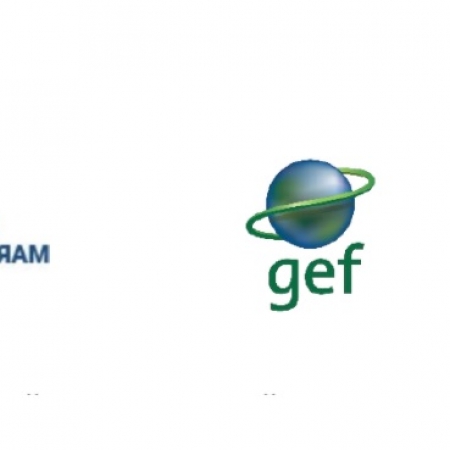 Announcement for Financial Audit Services for NAP Mongolia project2021-9-29
Announcement for Financial Audit Services for NAP Mongolia project2021-9-29Mongolia has accessed support under the GCF readiness and preparatory support, and activities are focusing on Establishing and strengthening the National Designated Authority (NDAs) or Focal Point. The project is expected to achieve the following outcomes:
 President of Mongolia Ukhnaagiin Khurelsukh "Protecting and cherishing our mother Earth, plants, animals, mountains and the environment will thrive as public action"2021-6-26
President of Mongolia Ukhnaagiin Khurelsukh "Protecting and cherishing our mother Earth, plants, animals, mountains and the environment will thrive as public action"2021-6-26The 6th President of Mongolia Ukhnaagiin Khurelsukh was inaugurated Friday in the Great Hall of the State Palace. Upon receiving his office, President of Mongolia addressed the nation from the podium of the Great Hall. During his speech to the public, he said that nature conservation and environmental protection has to be a public cause whereas we should nurture the love to Mother Earth
 Call for Proposals: Financing Programme for JCM Model Projects in FY20212021-6-15
Call for Proposals: Financing Programme for JCM Model Projects in FY20212021-6-15The Global Environment Centre Foundation (GEC) as an implementing organization for the Financing Programme for Joint Crediting Mechanism (JCM) Model Projects in FY2021, is soliciting the project proposals for the financing programme. (1) Purpose Japan establishes and implements the Joint Crediting Mechanism (hereinafter referred to as “JCM”) in order both to appropriately evaluate contributions from Japan to GHG emission reductions or removals in a quantitative manner achieved through the diffusion of decarbonizing technologies, products, systems, services, and infrastructure as well as the implementation of mitigation actions in developing countries. Starting from Mongolia in January 2013, Japan has established the JCM with 17 partner countries (Mongolia, Bangladesh, Ethiopia, Kenya, Maldives, Viet Nam, Lao PDR, Indonesia, Costa Rica, Palau, Cambodia, Mexico, Saudi Arabia, Chile, Myanmar, Thailand and Philippine) at this moment. In order to support the implementation of candidate JCM projects, the Ministry of the Environment, Japan (hereinafter referred to as “MOEJ”) has launched the “JCM Model Projects (hereinafter referred to as “model project”),” which includes collaboration with projects supported by the Japan International Cooperation Agency and other governmental-affiliated financial institution. The purpose of this model project is to financially support the implementation of projects which reduce GHG emissions by utilizing leading decarbonizing technologies in developing countries, and in return seek to acquire JCM credits for the achievement of Japan’s GHG emission reduction target. In FY2021, Call for Proposals of Program to Demonstrate Decarbonizing Technology for Realizing Co-Innovation starts at the same time as Financing Programme for JCM Model Projects. If the proposal is considered as appropriate to apply for Co-Innovation in the selection process, applicants will be able to change the application category from JCM Model projects to Co-Innovation even after the submission of a proposal. (2) Who is eligible to submit a proposal? A Japanese entity as a representative participant of an international consortium which is an association (no legal personality) that consists of a Japanese entity and a foreign entity(ies), etc., with the objective of effectively implementing a project. (3) Implementation Period of Model Projects The implementation period of the model projects (i.e
 Antarctic seals are helping scientists learn more about melting glaciers2021-5-26
Antarctic seals are helping scientists learn more about melting glaciers2021-5-26Өнөөдрийн байдлаар Байгаль орчны салбарт гадаадын хөрөнгө оруулалттай 20 төсөл, хөтөлбөр амжилттай хэрэгжиж байгаа
 Climate Change 2021: Global Warming Effects2021-4-18
Climate Change 2021: Global Warming Effects2021-4-18Climate Change 2021: Global Warming Effects The Pandemic has shaken much of human society, but still the threat posed by global warming has not gone away. The Earth's average temperature is about 15 degree Celsius, in recent years the temparature has been much higher and lower
 Climate change forces Mongolia's herders to move to the city2021-4-15
Climate change forces Mongolia's herders to move to the city2021-4-15In Mongolia, nomadic herders are seen as the proud heirs of Genghis Khan and are nicknamed "the emperors of the plains". But in recent years, global warming has had dramatic consequences for their way of life
 Уур амьсгалын өөрчлөлтийн асуудлыг шийдвэрлэхэд залуусын оролцоо2021-3-3
Уур амьсгалын өөрчлөлтийн асуудлыг шийдвэрлэхэд залуусын оролцоо2021-3-3Энэхүү дугаарын зочноор байгаль орчны мэргэжилтэн Б.Онон оролцлоо. Тэрээр саяхан Кембриджийн их сургуульд Conservation Leadership (Байгаль хамгааллын манлайл...
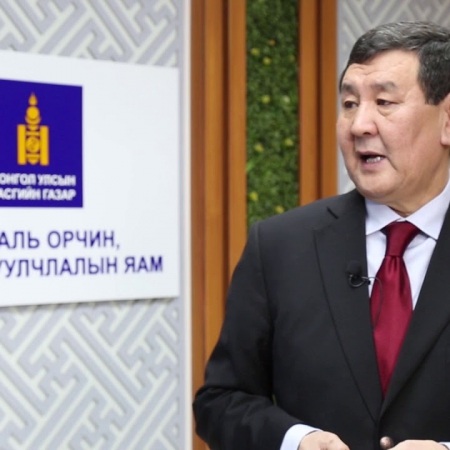 уур амьсгалын өөрчлөлтийг сааруулах, дасан зохицох, хүлэмжийн хийн ялгарлыг 12,3 хувиар бууруулна.2021-2-25
уур амьсгалын өөрчлөлтийг сааруулах, дасан зохицох, хүлэмжийн хийн ялгарлыг 12,3 хувиар бууруулна.2021-2-25Ирэх дөрвөн жилд уур амьсгалын өөрчлөлтийг сааруулах, дасан зохицох, хүртээмжтэй ногоон хөгжлийн бодлого хэрэгжүүлж, хүлэмжийн хийн ялгарлыг 12,3 хувиар буур...
 Simplified Approval Process pilot scheme (SAP)2021-1-11
Simplified Approval Process pilot scheme (SAP)2021-1-11Easier access to GCF resources for smaller scale activities
 GCF projects are showing rapid acceleration in implementation2021-1-11
GCF projects are showing rapid acceleration in implementation2021-1-11The 21st meeting of the Green Climate Fund (GCF) Board ended today in Bahrain, approving over one billion dollars of new projects and programmes to support climate action in developing countries, and formally launching the Fund’s first replenishment.
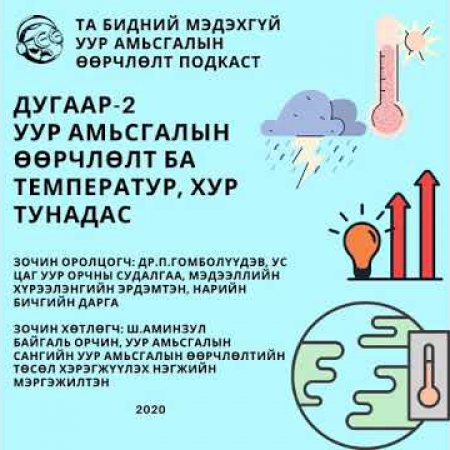 Уур амьсгалын өөрчлөлт ба температур, хур тунадас2020-12-29
Уур амьсгалын өөрчлөлт ба температур, хур тунадас2020-12-293 долоо хоног бүр та бүхэндээ хүргэж буй “Бидний мэдэхгүй уур амьсгалын өөрчлөлт подкаст”-ын хоёр дахь дугаарыг хүлээн авч сонсоно уу. Энэ дугаарт Ус цаг уур...
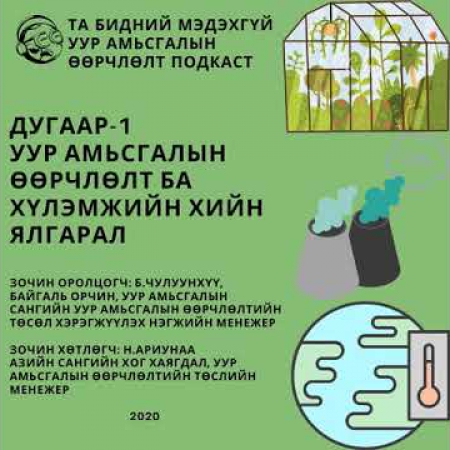 Уур амьсгалын өөрчлөлт, хүлэмжийн хийн ялгарал2020-12-24
Уур амьсгалын өөрчлөлт, хүлэмжийн хийн ялгарал2020-12-24Байгаль орчин, уур амьсгалын сангийн Бидний мэдэхгүй уур амьсгал цуврал подкастын эхний дугаараар Уур амьсгалын өөрчлөлт ба хүлэмжийн хий сэдвийн хүрээнд Б.Ч...
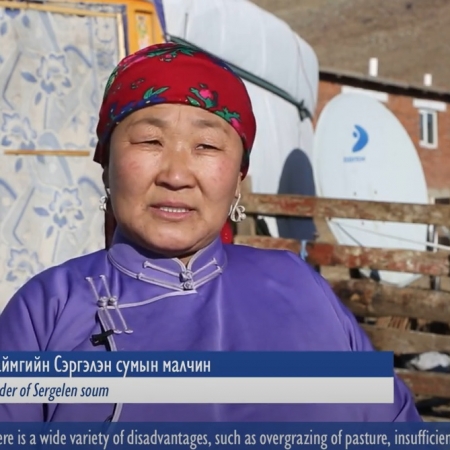 Climate change affects the migration of Mongolian herders2020-10-10
Climate change affects the migration of Mongolian herders2020-10-10Prolonged droughts and harsh winters in Mongolia’s rural pasturelands are driving herders from their native lands and into cities as herding becomes more and more challenging. This #WorldEnvironmentDay, explore the human side of climate change.
 Climate change and human health2020-3-30
Climate change and human health2020-3-30Climate change is the greatest challenge of the 21st century. It’s already causing rising sea levels, melting glaciers and permafrost, more frequent extreme events such as droughts, floods, and hurricanes. Mongolian annual mean air temperature has risen by 2.25 degrees Celsius in the last 79 years
 China's greenhouse gas emission cut by 25% temporarily because of coronavirus2020-3-2
China's greenhouse gas emission cut by 25% temporarily because of coronavirus2020-3-2As the world’s largest greenhouse gas emitter accounting for approximately 27% of global GHG emissions (excluding LULUCF), China’s actions both at home and abroad have an enormous impact on global greenhouse gas (GHG) emissions. China has policies in place to reach the targets set in its NDC. If reached, they would result in GHG emission levels of roughly 13.7–18.4 GtCO2e/yr in 2030
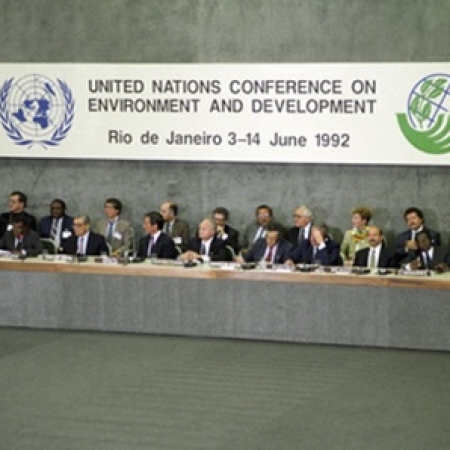 Conference of the parties and their historical timeline2020-2-7
Conference of the parties and their historical timeline2020-2-7World Meteorological Organization (WMO) and UN Environment Programme (UNEP) establish the Intergovernmental Panel on Climate Change (IPCC). To this day IPCC assessments are the scientific underpinning of international negotiations while also providing unique insights into, for example, managing the risk of extreme events and disasters.
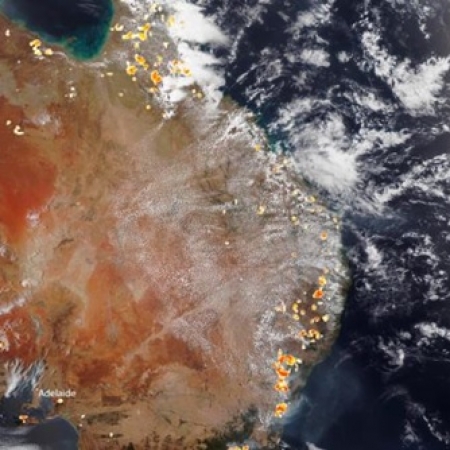 Australia’s deadly wildfires are showing no signs of stopping2020-1-6
Australia’s deadly wildfires are showing no signs of stopping2020-1-6A total of 24 people have died nationwide, and in the state of New South Wales alone, more than 1,300 houses have been destroyed.
 Curbing Climate Change and Preventing Deaths from Air Pollution Go Hand-in-Hand2019-3-1
Curbing Climate Change and Preventing Deaths from Air Pollution Go Hand-in-Hand2019-3-1The World Health Organization (WHO) is turning its attention to this issue this week at its first global conference to improve air quality, combat climate change and save lives. It's time to gather all allies in the fight for clean air
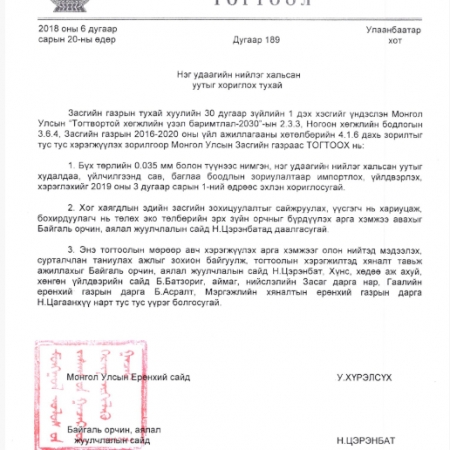 PROHIBITION FOR PRODUCING AND IMPORTING PLASTIC BAGS THINNER THAN 0.035MM AS OF MARCH 1, 20192019-1-11
PROHIBITION FOR PRODUCING AND IMPORTING PLASTIC BAGS THINNER THAN 0.035MM AS OF MARCH 1, 20192019-1-11By the Government Order of June, 2018 it has been prohibited to produce and/or import all kinds of disposable plastic bags thinner than 0.035mm for products and services as of March 1, 2019. Since plastic bags are wastes that doesn’t decompose in the nature by itself, many countries of the world are taking right measurements and setting related regulations
 “National program for reducing forest shortage and its degradation” workshop was successfully organized2019-1-6
“National program for reducing forest shortage and its degradation” workshop was successfully organized2019-1-6Mongolian Government have approved “National Program for reducing forest shortage and its degradation” on December 20, 2018 with the intention of increasing forest area to 9% by 2030. Oyunsanaa. B, Head of Forest Policy Regulation Department of the Ministry of Nature and Tourism commented: “Global trend has been changing rapidly and by advancing forestation is not only a work of the any one sector but the whole community and people benefit from it equally
 "GREEN PASSPORT" campaign brought the world’s highest reputable award of the environmental sector2018-12-26
"GREEN PASSPORT" campaign brought the world’s highest reputable award of the environmental sector2018-12-26The UK based Green World organization, which has its headquarter in London, has awarded Environment and Tourism Minister Mr
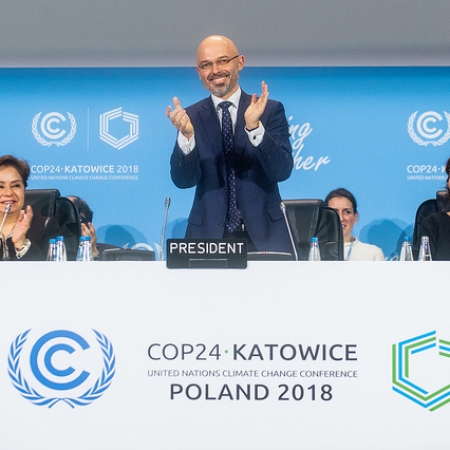 Success of COP24 in Katowice – we have a global climate agreement2018-12-19
Success of COP24 in Katowice – we have a global climate agreement2018-12-19Negotiators from 196 countries and the European Union worked for two weeks on the Katowice Climate Package, implementing the Paris Agreement. More than a dozen intense meetings enabled negotiations to be successful on different topics regarding principles aimed at implementing the Paris Agreement, which was signed in 2015. For two weeks, a wide range of issues were discussed – some fundamental, others very detailed and technical – which gave birth to a complex and difficult document
 MEMORANDUM OF UNDERSTANDING HAS BEEN SIGNED WITH JAPAN FOR COOPERATION ON ENVIRONMENT2018-12-18
MEMORANDUM OF UNDERSTANDING HAS BEEN SIGNED WITH JAPAN FOR COOPERATION ON ENVIRONMENT2018-12-18Prime Minister of Mongolia H.E. Mr
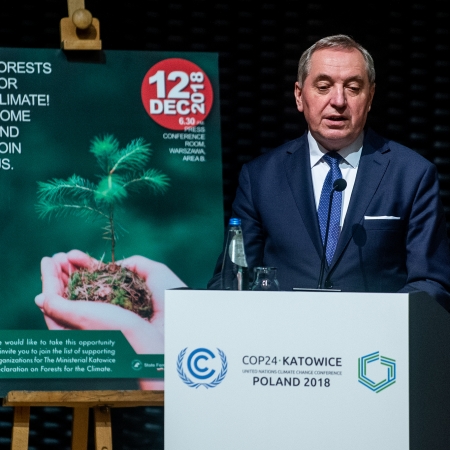 The “Forests for Climate” Katowice Ministerial Declaration Has Been Accepted2018-12-17
The “Forests for Climate” Katowice Ministerial Declaration Has Been Accepted2018-12-17The role of forests in the Paris Agreement The Paris Agreement shows a general will to get involved in a global effort aimed at achieving a balance between anthropogenic emissions of greenhouse gases deriving from sources and their absorption by scrubbers and absorbing agents. Responsibility for achieving this goal lies with all governments, because it can only be achieved through a global effort. The fifth article of the Paris Agreement is one of the most important articles because it indicates the way to implement the basic premise of this document, that is, the balance between emissions and absorption in the second half of this century
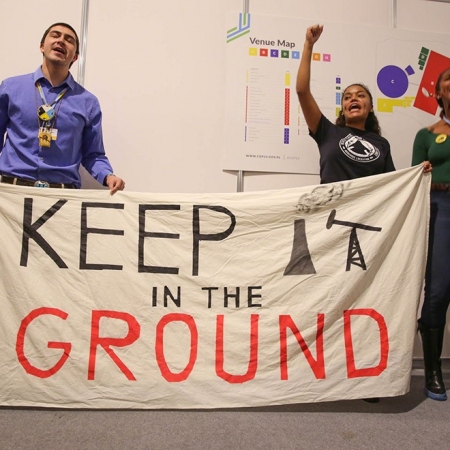 Highlights for Monday, 10 December 20182018-12-12
Highlights for Monday, 10 December 20182018-12-12Members of civil society hold a demonstration on the 70th anniversary of the UN Declaration of Human Rights, reminding delegates of the human rights defenders who have lost their lives in defense of those rights As the Katowice Climate Change Conference began its second week, ministers and negotiators engaged in discussions on climate action before 2020 and climate finance
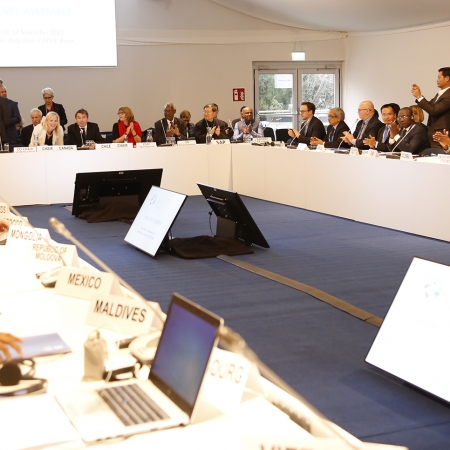 10th Meeting of the High Level Assembly of the Climate and Clean Air Coalition (CCAC) to Reduce Short-Lived Climate Pollutants (SLCPs)2018-12-10
10th Meeting of the High Level Assembly of the Climate and Clean Air Coalition (CCAC) to Reduce Short-Lived Climate Pollutants (SLCPs)2018-12-10The role of the High Level Assembly of the Coalition partners is to set policy, take stock of progress and initiate future efforts.
 COP24: A million lives could be saved by 2050 through climate action, UN health agency reveals2018-12-10
COP24: A million lives could be saved by 2050 through climate action, UN health agency reveals2018-12-10Taking bold climate action now, could help save a million lives and a lot of money by the middle of the century, said the World Health Organization (WHO) on Wednesday, launching a special report as part of the ongoing COP24 climate conference in Katowice, Poland.
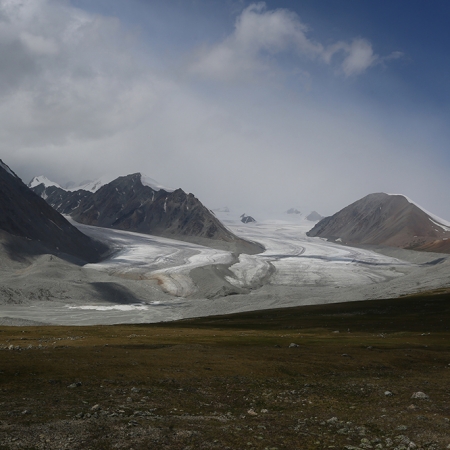 COP24: UN climate change conference, what’s at stake and what you need to know2018-12-8
COP24: UN climate change conference, what’s at stake and what you need to know2018-12-8As global temperatures continue to rise, climate action is lagging and the window of opportunity is closing. On Sunday, the United Nations will kick off critical negotiations on how to address the problem collectively and urgently, during a two-week climate change conference in Katowice, Poland, known as “COP24”.
 Highlights for Wednesday, 5 December 20182018-12-6
Highlights for Wednesday, 5 December 20182018-12-6The Katowice Climate Change Conference continued on Wednesday with technical negotiations, but decision makers also began to engage at more political levels on key issues in the Paris Agreement Work Programme (PAWP). Throughout the day, informal consultations and contact groups took place as delegates worked through key negotiation issues ranging from finance to the transparency framework. The technical part of the stocktake on pre-2020 implementation and ambition convened in the morning
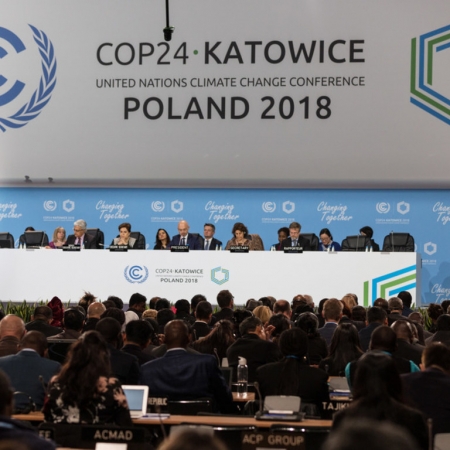 COP24: green, gender focus, as UN's crucial climate change conference gets underway2018-12-5
COP24: green, gender focus, as UN's crucial climate change conference gets underway2018-12-5Days after the UN sounded the alarm on the unprecedented levels of greenhouse gas concentrations in the atmosphere, the world is gathering to define how the 2015 Paris Agreement will be implemented and moved forward. Under the agreement, all countries have committed to reduce greenhouse gas emissions in order to limit the global average rise in temperature to well below 2°C, and as close as possible to 1.5°C. Cycling for the planet Kicking off the two-week event in Katowice, which has historically been a coal-mining town in the south of Poland, a team of cyclists on electric bikes arrived from Vienna, having biked 600 km to demonstrate the value of renewable energy to reducing emissions. The expedition was supported by the UN Global Compact, a group of private sector companies committed to sustainable development. The cycling team, called “Moving for Climate NOW”, made up of about 40 people from different institutions and countries, was welcomed by UN Climate Change Deputy Executive Secretary, Ovais Sarmad, and Jakub Gibek, Head of the Climate Policy Unit of the Ministry of Environment of Poland. “I commend the cyclists involved in this bike tour for inspiring the world to move in the right direction to fulfil the promise of the Paris Agreement," said Mr
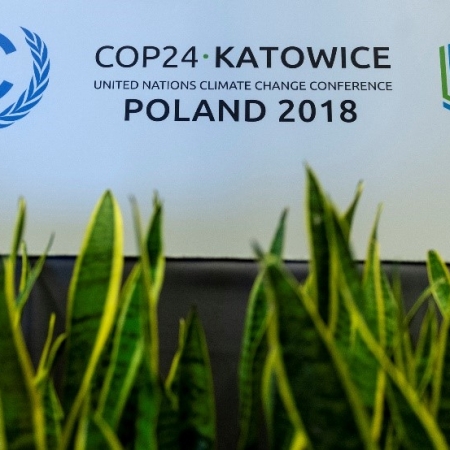 COP24 environmentally friendly2018-12-4
COP24 environmentally friendly2018-12-4The UN global climate conference -COP24, which takes place on 2-14 December in Katowice, is organized in accordance with the environmental policy of the Ministry of the Environment, entered in the register of the eco-management and audit system EMAS. As a result the event, which will be attended by over 26,000 guests, remains environmentally friendly. EMAS -certification of the Polish Environment Ministry as a source of the highest environmental standards during COP24
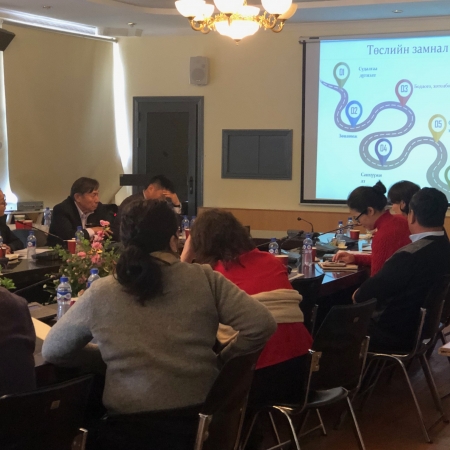 “CLIMATE MONITORING, ITS DEMAND, INTERNATIONAL COOPERATION AND OPPORTUNITIES” seminar successfully organized in Ulaanbaatar2018-11-29
“CLIMATE MONITORING, ITS DEMAND, INTERNATIONAL COOPERATION AND OPPORTUNITIES” seminar successfully organized in Ulaanbaatar2018-11-29Environment and Climate Fund and National Authority for Meteorological and Environment Monitoring jointly organized “Climate monitoring, its demand, international cooperation and opportunities” seminar on November 27, 2018 with support from the Strengthening National Authorities and Readiness Project funded by Climate Green Fund. Presentations presented in the seminar: “Climate monitoring, information services” by Ulambayar D, Head of National Network and Climate Services Department of NAMEM“Environmental quality and information services” by Batbayar J, Head of Environment Analysis Department of NAMEM“Groundwater monitoring and information services” by Davaa G, Scientific specialist of IRIMHE“Weather Forecast System and development trend” by Oyunjargal L, Head of Forecast Department of NAMEM“Climate change state and future trend” by Gomboluudev P, Head of Climate Change and Research Research Department of IRIMHE“International Cooperation and Opportunities” by Batjargal Z, Advisor to the Environment and Climate Fund.The seminar concluded with questions and answers sessions where participants questions of interest to them and exchanged valuable information and opinions. The seminar covered discussions within the climate and environmental issues such as Mongolian climate situations, environmental quality monitoring, weather forecasting system, future trends, challenges and current and future state of climate change. Climate change is a global challenge and developing countries such as Mongolia are still facing problems to decrease climate change as well as to adapt to the current state
 COP24 - United Nations Climate Change Conference in Katowice, Poland2018-11-29
COP24 - United Nations Climate Change Conference in Katowice, Poland2018-11-29COP24 - The 24th Session of the Conference of the Parties to the United Nations Framework Convention on Climate Change will take place on 3–14 December in Katowice, Poland. The event will be attended by nearly 30,000 delegates from all over the world including heads of government and environmental officials in charge of environmental and climate issues
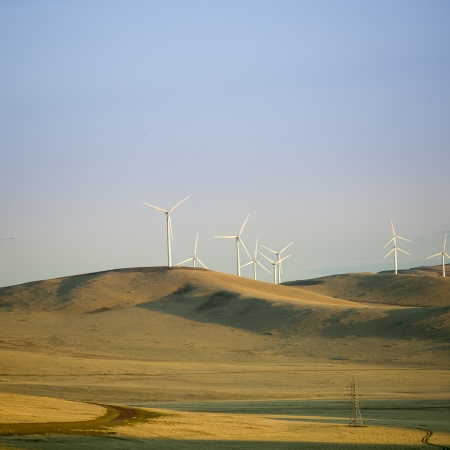 “CLIMATE AND ECO TECHNOLOGY” workshop to be organized.2018-11-20
“CLIMATE AND ECO TECHNOLOGY” workshop to be organized.2018-11-20Through this workshop, the organizers aim to support the efficient and effective projects and measurements that support the reduction of climate change in consideration of increased traditional and contemporary technology and techniques to combat pollution and desertification.
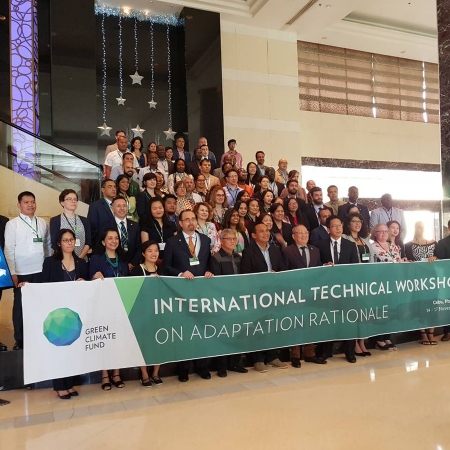 International Technical Workshop on Adaptation Rationale being held in Cebu City, PH2018-11-15
International Technical Workshop on Adaptation Rationale being held in Cebu City, PH2018-11-15Representative of NDA is participating in the International Second Technical workshop for Adaptation Rational in Cebu, Philippines to be organized by GCF from 14 to 16 November, 2018. Participants will include accredited Direct Access Entities (DAEs) focused on adaptation, National Designated Authorities (NDAs) and their delivery partners with approved adaptation planning project with the GCF, as well as experts in climate information, adaptation planning and project design
 Local artists shout out loud on climate change issues2018-11-12
Local artists shout out loud on climate change issues2018-11-12Those who stand in the sun are sure to cast shadows: this is the idea that accompanies Tamir Bayarsaikhan on his forays through the Valais. According to the law of causality, every action, however small, will have an impact on our environment
 GCF gives green light to largest climate project to date in EBRD partnership2017-11-14
GCF gives green light to largest climate project to date in EBRD partnership2017-11-14The Green Climate Fund (GCF) will start funding its largest climate finance investment to date following an agreement signed with the European Bank for Reconstruction and Development (EBRD).
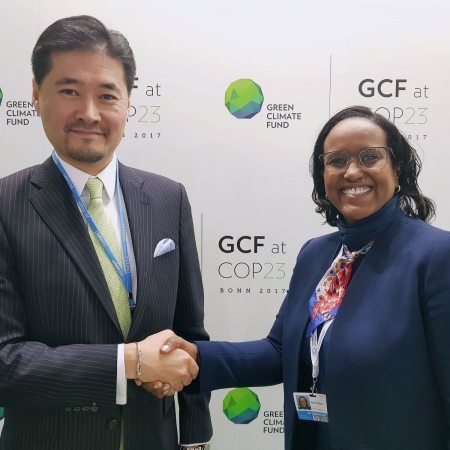 XacBank first Mongolian bank to finance renewable energy2017-11-11
XacBank first Mongolian bank to finance renewable energy2017-11-11QUICK TAKE – The Green Climate Fund has signed a funding agreement with Mongolian-based Direct Access Accredited Entity XacBank in the country’s first renewable energy project financed by a local bank. GCF can now provide USD 8.7 million in loans, following the signing of a Funded Activity Agreement (FAA) with the Mongolian bank
 GCF hails Mongolia partnerships as model for mobilising private capital2017-9-15
GCF hails Mongolia partnerships as model for mobilising private capital2017-9-15Mobilising private sector capital is critical to climate transformation, and GCF’s partnerships in Mongolia demonstrate how the Fund can leverage public funds to engage private investment. This was the message emphasised by Ayaan Adam, Director of GCF’s Private Sector Facility, in a statement to the Mongolian Sustainable Finance Forum on Thursday. ”GCF is providing strong support for developing countries to build their climate capacity and ownership,” stated Ms Adam in her keynote speech. “We are also using public funds to catalyze private players and encouraging their full participation, providing creativity, innovation and massive capital for climate action,” she explained
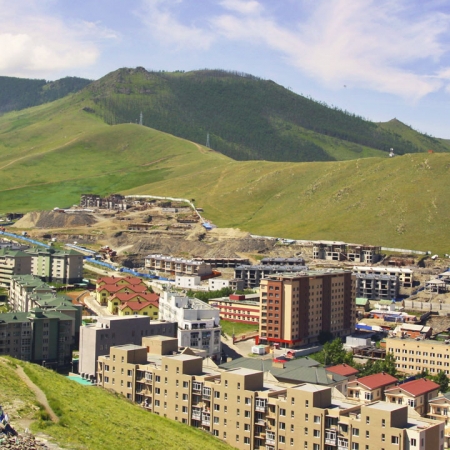 GCF backs Mongolian forum to open up low-emission, business paths2017-9-5
GCF backs Mongolian forum to open up low-emission, business paths2017-9-5XacBank, a Green Climate Fund (GCF) Accredited Entity, is helping Mongolia forge a new sustainable phase in its economic growth by holding the bank’s first green finance forum on Wednesday.The one-day event run by XacBank, and supported by GCF, is designed to tap the entrepreneurial energies of the country’s private sector to drive low-emission innovation. It will bring together a range of experts to explore how to reduce greenhouse gas emissions and enhance energy efficiency, while also making Mongolian businesses more competitive.The forum marks a crucial phase in ongoing endeavours by XacBank, one of Mongolia’s major lenders, to carve out a low-carbon energy sector in this landlocked country.In July, GCF completed a USD 20 million transfer of climate finance to XacBank as part of a USD 60 million project to support micro, small and medium-sized enterprises (MSMEs) finance low-carbon initiatives in Mongolia.The bulk of GCF’s support is in the form of loans, with at least half directed at women-led enterprises.Speaking before the first of what XacBank plans to be yearly green finance forums, the bank’s president stressed the important role of Mongolian women in driving low-emission business opportunities.“The increased involvement of women should mean a higher probability of effective climate finance,” said Amar Hanibal
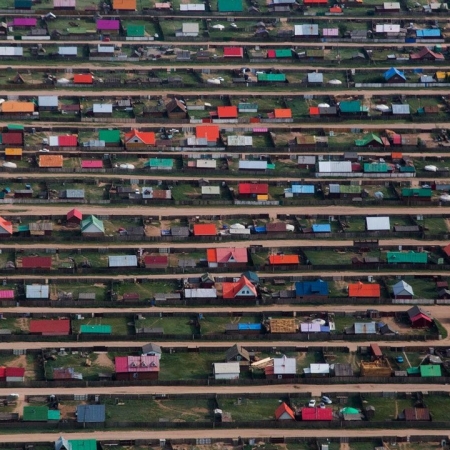 GCF completes USD 20 million transfer to drive clean Mongolian energy sector2017-7-3
GCF completes USD 20 million transfer to drive clean Mongolian energy sector2017-7-3The Green Climate Fund is helping Mongolian enterprises kick start a national, low-carbon energy sector with its completion of a USD 20 million funds transfer to a Mongolian bank. The bulk of GCF’s contribution, USD 19.5 million, will allow Mongolia’s XacBank extend loans to micro, small and medium-sized enterprises to break down financial barriers to low-carbon investment. An aversion to the risks of opening new markets means Mongolian entrepreneurs currently lack the necessary commercial finance to carve out new businesses in energy efficiency and renewable energy. This five-year project is being implemented by XacBank, one of Mongolia’s major lenders which became the country’s first and only bank specializing in eco-banking in 2009. At the end of last year, GCF designated XacBank as a direct access Accredited Entity, which propose and implement GCF-financed climate initiatives. “This disbursement marks an important milestone in the continued development of sustainable financing business of XacBank and our cooperation with the Green Climate Fund,” said Amartuvshin Hanibal, President of XacBank. While many Mongolian people currently burn low-quality coal in their homes for heating and cooking, the government is striving to leap frog their landlocked nation into adopting a low-carbon energy sector. In accordance with GCF’s gender focus, at least half of GCF’s loan support in this project will go towards women-led enterprises. “This project will empower women and reduce emissions,” said Ayaan Adam, Director of GCF’s Private Sector Facility
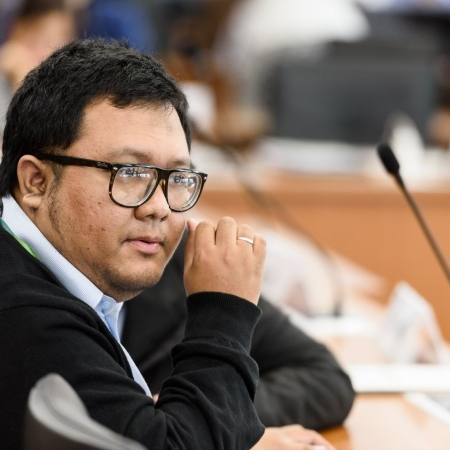 GCF workshop nurtures cross-border ideas2017-5-17
GCF workshop nurtures cross-border ideas2017-5-17Indonesia can learn from Mongolia’s placement of women-led small businesses on the climate action frontline, according to the representative of a state-owned corporation at a Green Climate Fund workshop.“As many of Indonesia’s smaller industries are run by women, we would benefit from bolstering their ability to deal with climate change,” said Alke Haesra, with PT Sarana Multi Infrastruktur (PT SMI), an Indonesian finance corporation funding infrastructure projects.Mr Haesra said he has learned a lot from other participants during GCF’s Empowering Direct Access workshop, which winds up today.He said he was particularly impressed with a GCF-funded programme run by Mongolia’s XacBank which helps local businesses tap renewable energy and energy efficiency opportunities. At least half of the micro, small and medium-sized enterprises (MSMEs) targeted in this GCF-funded climate finance programme are expected to be run by women.One of the best ways to deal with climate change is to bolster mid-sized and smaller businesses at the same time, added Mr Haesra.“A focus on strengthening smaller enterprises also matches with the Indonesian Government’s current focus on growing MSMEs as the foundation of Indonesia's economy to better protect it from financial crises such as the one that hit Indonesia in 2008,” he said.Mr Haesra has followed GCF’s call during the workshop to learn from others
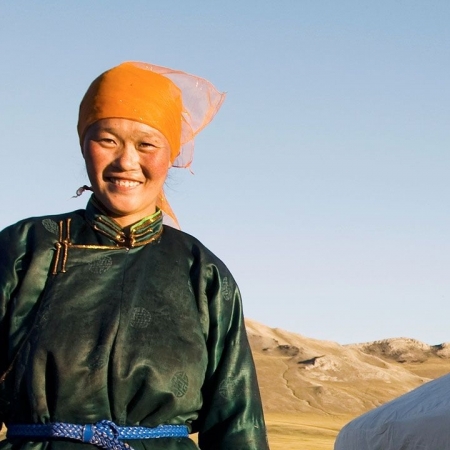 GCF begins funds transfer to Mongolia’s XacBank2017-5-11
GCF begins funds transfer to Mongolia’s XacBank2017-5-11The Green Climate Fund has completed the initial tranche of a USD 20 million financing package to XacBank, a leading lender in Mongolia.A major part of GCF’s opening financial transfer will raise awareness about the potential of tackling climate change in the country’s fledgling low-carbon energy sector. It will help XacBank train entrepreneurs find new business opportunities in this sector and compile a list of best-available technologies in renewable energy and energy efficiency to provide investment assurance.Anand Batsukh, a senior project development officer at XacBank, said GCF assistance will help XacBank complement the Mongolian Government’s efforts to mainstream energy usage as the first step towards boosting energy efficiency and renewable energy.The Mongolian Government is encouraging citizens to derive their energy from electric power grids
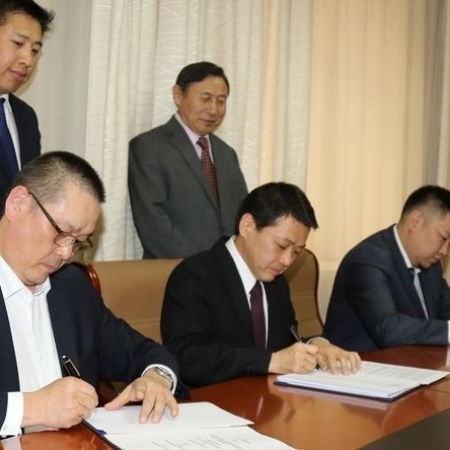 JICA to support Mongolia’s effort for climate change mitigation2017-4-14
JICA to support Mongolia’s effort for climate change mitigation2017-4-14Ulaanbaatar /MONTSAME/ On April 18, the Japan International Cooperation Agency (JICA) signed 'Minutes of Meeting' with the Ministry of Environment and Tourism of Mongolia and the Environment and Climate Fund, mutually agreed upon the framework and contents of technical cooperation for the Project for capacity development to establish a national green house gas inventory cycle of continuous improvement. The purpose of the project is to regularly improve the green house gas inventory with the cooperation of relevant institutions so that the improved green house gas inventory is utilized for the development of mitigation action planning and monitoring in Mongolia. The tentative duration of the project will be four years from autumn 2017
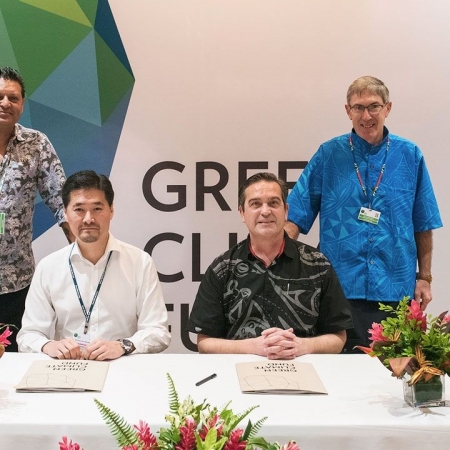 Mongolia’s XacBank signs accreditation agreement as GCF Partner2016-12-14
Mongolia’s XacBank signs accreditation agreement as GCF Partner2016-12-14Mongolia’s XacBank today signed an Accreditation Master Agreement (AMA) with the Green Climate Fund, setting out its partnership with GCF to forge low-emissions and climate-resilient development paths in Asia.“There is a big potential in Mongolia for businesses to generate profits by introducing new economically and environmentally sustainable ways of doing things,” said Mr. Amartuvshin Hanibal, President of XacBank on the sidelines of GCF’s 15th Board meeting

#305, 306, 3th floor, Building of the Center for Freshwater Resources and Nature Conservation, 9th Street, 11th Khoroo, Khan-Uul District, Ulaanbaatar, Mongolia